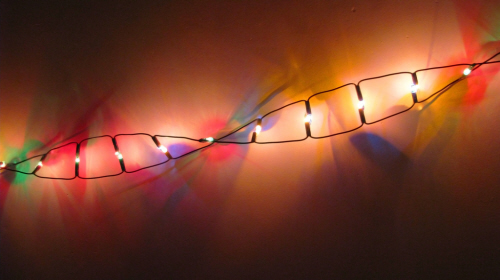
Actress Mia Farrow made gossip-news headlines this week when, asked by whether her former husband Frank Sinatra was the father of her son Ronan, rather than Woody Allen as broadly understood, she replied, тpossibly.т She said that no paternity test had been done.
My first thought when I saw this was, some tabloid reporter without any ethics is going to try to surreptitiously get a sample of Ronan Farrowтs DNA, and of Woody Allenтs, and have both tested. If it were possible to get a copy of Sinatraтs DNA, they'd probably try that too. I guess the only disadvantage for a newspaper might be the uproar that ensues once the story is publishedтthough, that might just make the reporter famous and sell lots of copies.
Iтve long that sooner or later weтd start to see the unauthorized collection and testing of DNAтand that it would start with celebrities. Or I should say, Iтve feared that unauthorized collection would expand beyond the police, who already engage in this practice and claim the ability to do so without a warrant. (For more on surreptitious DNA gathering, see this in the book Genetic Justice by Sheldon Krimsky and my former РЯАФУХПЊНБНсЙћ colleague Tania Simoncelli, as well as this law review by Albert Scherr.)
DNA is very easy to acquire. We constantly slough off hair (40-100 strands per day), skin cells (30,000-40,000 per minute) and other samples of our DNA. Household dust is made up primarily of dead human skin cells. Our DNA can also be extracted from such sources as coffee cups, cigarette butts, and the flaps of envelopes that have been licked.
That means no matter how hard we strive to keep our genetic code private, weтre always vulnerable to other partiesт secretly testing samples of our DNA. And the cheaper it gets to actually test DNA samples, the more tempting it will be for various parties to do so. By the time we all have access to that can provide instant readings, we may find ourselves in a situation in which almost anyone can read anyone elseтs genetic profileтincluding information about ethnic ancestry, mutations, disease proclivities, and whatever else we may learn about the human genome. We could see scenarios such as:
- Everyone from schoolchildren to dating couples to nosy neighbors routinely checking out each otherтs profiles.
- Celebritiesт genetic profiles being posted on the Internet
- Potential employers running DNA profiles on job candidates (though this would be illegal under the Genetic Information Nondiscrimination Act of 2008 or , as would the use of genetic information in health insurance decisions).
- Individuals or companies using collection devices in crowded places to suck up as many human cells as possible, perhaps because they are searching for a relativeтs killer, a compatible donor for a sick relative, for blood relatives lost through adoption, or maybe even as marketing leads (in combination with partial, identificatory DNA databases).
Already, as Scherr points out, there have been cases where and a working a celebrity divorce have used surreptitious DNA to try to establish paternity.
As it now stands there is no clear law against the surreptitious reading of DNA. When it comes to the police, the Supreme Court recently on DNA, finding that the Constitution does not bar the taking of DNA from suspects who have been arrested but not convicted of any crime. And as Scherr summarizes the current jurisprudence on surreptitious gathering,
Surreptitious DNA harvesting by the police is currently unregulated by the Fourth Amendment. The few courts that have addressed the issue consistently find that the police are free to harvest DNA abandoned by a putative suspect in a public place. Little in the nascent surreptitiousтharvesting case law suggests that surreptitious data banking would be regulated under current judicial conceptions of the Fourth Amendment.
We think that is wrong (as does Scherr), but thatтs the jurisprudence so far. When it comes to surreptitious collection by private parties, in the absence of any privacy law in this area thereтs even less that our fictional tabloid reporter would have to worry about.




